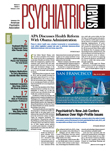In response to the Obama transition team's request to hold community discussions on health care reform, the AMA Residents and Fellows Section recently organized a teleconference to solicit feedback from residents in all specialties.
As a participant in that teleconference, I was surprised at residents' initial reluctance to consider a nationalized, single-payer health care system. Many thought that a nationalized system would undermine the free-market economy, allow government to dictate how medicine is practiced, lead to deterioration of health care quality, and encourage patients to abuse health care access while ignoring their own responsibility to take care of their health.
Perhaps I was surprised because I received my undergraduate medical training in Canada, where I witnessed high-quality, cost-effective, and universally accessible care delivered under a nationalized system that has operated in a thriving free-market economy for decades.
For doctors who haven't had firsthand experience with such a system, I urge you to consider how your practice would change if you were able to diagnose and treat patients based on medical evidence and the patients' best interests, rather than on whether they had insurance and what medications and procedures they could afford.
Unfortunately, a private health care system guarantees neither quality care nor professional autonomy. For example, several residents believed it would be beneficial to create a centralized, electronic database of individual patients' health information. This is an excellent idea that would undoubtedly improve care by facilitating communication between providers, and it would also reduce costs by freeing legions of support staff from maintaining separate medical records.
In our private system, however, government interference already exists to an extent that renders such a plan impossible. In order for a centralized database to be implemented in a way that would realize either of these benefits, the Health Insurance Portability and Accountability Act (HIPAA)—which imposes tremendous costs on the current system while it obstructs communication between health care providers—would have to be dismantled. I believe that its communication barriers not only cause hassles for physicians, but also harm patients more than any theoretical damage that might result from inadvertent disclosure of personal health information.
Some opponents of nationalized health care believe that the availability of“ free” care will encourage people to neglect their health, knowing that they can go to the doctor any time they desire. It is contradictory, however, to claim that universal coverage will encourage patients to ignore their health while at the same time promoting overuse of health care.
Opponents also claim that nationalized health care would reduce the quality of care. However, I have yet to see evidence that the quality of health care in any of the 36 countries ranked above the United States in the World Health Organization's (WHO) overall health care ranking has been adversely impacted by inappropriate use of services.
I would also point out that a national health care system is not incompatible with private health care delivery. Anyone interested in meaningful health care reform should look carefully at the French system. It ranks first in the WHO ranking, and though nationalized, it blends universal access with free-market principles and effectively balances cost-effectiveness with high-quality care. Many Americans are concerned that a nationalized system would lead to health care “rationing,” but most French citizens do not perceive that health care is being rationed in their country. In fact, major strengths of the French system include freedom to choose providers and superior access to specialty care, compared with other health care systems.
Other conference-call participants were concerned that physicians increasingly make specialty choices and employment decisions based on the need to pay back medical school loans. Although training new doctors benefits society, in our system the cost of medical education is borne primarily by the trainees. This burden may present a significant obstacle to meaningful health care reform if it discourages medical school graduates from entering less remunerative primary care specialties. To ensure continuing access to primary care in coming decades, the new administration must act to preserve programs such as the 20/220 loan-deferment pathway and explore other options to ensure that the cost of medical education does not dissuade people from entering or remaining in the profession.
Finally, current debate over the effect of long shifts on patient safety must be expanded to consider unforeseen consequences that might result from further limitations on resident working hours. Shorter shifts may lead to fewer medical errors, but would also necessarily reduce the total number of physicians on duty at any given time across the country. There is a high likelihood that this situation could reduce access to medical care and increase costs by necessitating the hiring of “physician extenders.” However, to my knowledge these contingencies have not been investigated.
No matter what direction the Obama administration takes to reform our ailing health care system, residents will be affected for the rest of their careers. The new administration has asked for our input through national teleconferences and community discussions, but this is only one way to participate in the democratic process. Whatever your position on the issues, I urge you to look for ways to become involved by advocating for a system that works better for patients and physicians. Our patients and our future depend on it. ▪

